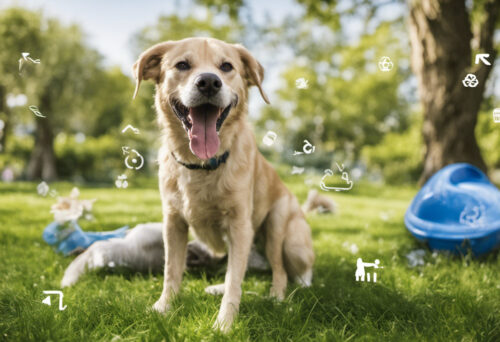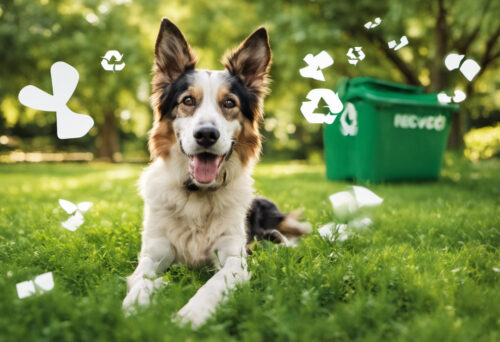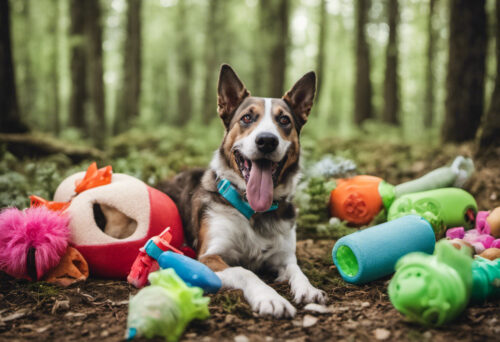We may not always realize it, but every single choice we make impacts the world around us. The dogs we love and cherish are no exception. Today, we're shedding light on an eco-friendly step we can all consider: adopting older dogs.Unsung Heroes: Older Dogs in Shelters
There's a special kind of nobility in the soul of an older dog. Often calmer, with a quiet wisdom in their eyes, these older dogs might not have the youthful vigour of a puppy, but are usually bursting with love, loyalty, and the desire for companionship. Unfortunately, they are the majority in shelters and are often overlooked for adoption in favour of their younger counterparts. Puppies tend to get adopted faster simply because they're seen as 'cuter'. The result is that these older dogs stay longer in the shelters, leading to overcrowded conditions and excessive use of resources. But what's the environmental impact?Eco-Impact: Adoption over Breeding
Before we jump to eco-impacts, let's be clear, there's no villainization of breeders here. It's rather an encouragement to opt for adoption, especially of older dogs. Choosing an older dog from a shelter or rescue organization can save resources and reduce carbon footprints. Save resources - how? Well, it's primarily through the reduction in breeding practices.The Carbon Paw-print
Breeding dogs is a resource-intensive process. It’s much more than the food, water, and shelter the dogs need to survive. The pet industry contributes significantly to the overconsumption of resources, from the non-recyclable toys and packaged foods to the plastic waste from poop scoops and baggies. By adopting older dogs, we reduce the need for breeding, thus easing the burden on environmental and natural resources.Recycled Love – Less Waste
When you adopt an older dog, chances are, they already come with basic training. This implies fewer destroyed shoes, less wasted dog training gear, less driving to training sessions, and overall, less waste generated. Peta offers great insights on this. Moreover, with an older dog, you can skip over those 'growing up' supplies like puppy pads, small kennels that rapidly become too small, and other growth-phase specific items, thereby easing the impact on landfills.Health Benefits of Older Dogs: An Added Plus
Although the focus here is on environmental benefits, let's quickly highlight some health bonuses. Older dogs tend to have a calming effect, potentially helping to reduce anxiety and stress levels. For the eco-conscious person, this can mean less reliance on non-renewable pharmaceutical aids. Psychology Today has an outlay on the mental health benefits of older dogs.

Nature Rallies: Less Environmental Degradation
Elements of dog breeding and ownership like excessive fertilization and pesticide use on farms that breed dogs don’t just tax the local environment—they also strain global habitats. Alleviating the demand for breeding pup farms means you’re indirectly assisting some of our most critical landscapes in regaining their health. Check out this Science Daily article for more on how breeding can impact environments.
Reduced Water Usage
Water is a crucial resource in the process of breeding; gallons of water are consumed by breeding facilities to maintain hygiene and well-being of dogs. Over time, this takes a toll on our water supply. The Water Calculator offers a profound outlook on this issue. By adopting an older dog, you’re contributing directly to water conservation.
Improving City Livability: Reduced Stray dogs
When older dogs are adopted, it helps to reduce the population of stray dogs which in return results in lesser noise pollution, reduced animal control expenses and fewer road accidents. This World Health Organization bulletin explains the full scope of this issue.
Restating the Environmental Benefits
Adopting older dogs isn’t just a morally sound choice—it’s an environment-friendly one. You’re encouraging a cycle of care and conservation over consumption, contributing positively to the planet. Plus, you’re getting a loyal, loving companion as an icing on the cake. A SingleTrack article enumerates more details about this.
In Summation: Every Adoption Counts
Every older dog adopted equals one less dog being bred, one less set of resources being deployed in breeding processes, and one less strain on our global landscapes and water supply. It may seem like a drop in the ocean, but remember – every ocean is formed of tiny drops. This Stanford article beautifully illustrates this.
When we choose to adopt older dogs, we’re not just bringing happiness into their life and ours, but we’re also contributing positively to the health of our planet. So, let’s pledge to offer our love to the older heroes in the shelters and help heal our environment, one adoption at a time.

Nature Rallies: Less Environmental Degradation
Elements of dog breeding and ownership like excessive fertilization and pesticide use on farms that breed dogs don’t just tax the local environment—they also strain global habitats. Alleviating the demand for breeding pup farms means you’re indirectly assisting some of our most critical landscapes in regaining their health. Check out this Science Daily article for more on how breeding can impact environments.
Reduced Water Usage
Water is a crucial resource in the process of breeding; gallons of water are consumed by breeding facilities to maintain hygiene and well-being of dogs. Over time, this takes a toll on our water supply. The Water Calculator offers a profound outlook on this issue. By adopting an older dog, you’re contributing directly to water conservation.
Improving City Livability: Reduced Stray dogs
When older dogs are adopted, it helps to reduce the population of stray dogs which in return results in lesser noise pollution, reduced animal control expenses and fewer road accidents. This World Health Organization bulletin explains the full scope of this issue.
Restating the Environmental Benefits
Adopting older dogs isn’t just a morally sound choice—it’s an environment-friendly one. You’re encouraging a cycle of care and conservation over consumption, contributing positively to the planet. Plus, you’re getting a loyal, loving companion as an icing on the cake. A SingleTrack article enumerates more details about this.
In Summation: Every Adoption Counts
Every older dog adopted equals one less dog being bred, one less set of resources being deployed in breeding processes, and one less strain on our global landscapes and water supply. It may seem like a drop in the ocean, but remember – every ocean is formed of tiny drops. This Stanford article beautifully illustrates this.
When we choose to adopt older dogs, we’re not just bringing happiness into their life and ours, but we’re also contributing positively to the health of our planet. So, let’s pledge to offer our love to the older heroes in the shelters and help heal our environment, one adoption at a time.



